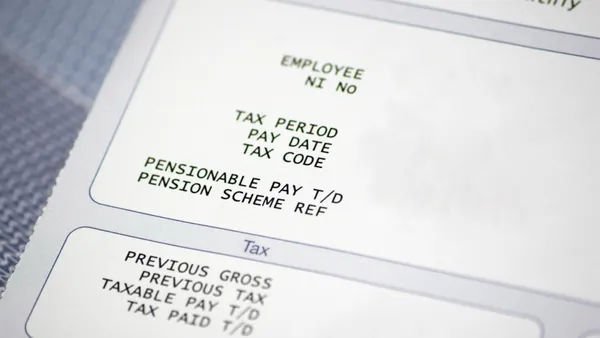Whether you employ grocery store clerks, construction workers, caregivers, or drivers, chances are your competitors are already offering, or at least considering, new benefits to attract and retain workers during COVID-19. As individuals seek faster, more flexible pay options to help meet their needs during a time when they are experiencing increased financial challenges, employers need to adjust.
In fact, according to a recent survey of over 300 HR executives across various industries conducted by HR Dive in partnership with Visa this past June-July, titled the Visa Hourly Talent Study, 67% of the surveyed HR executives said their organizations would be very likely to explore new benefits if they would reduce workers’ financial stress during COVID-19. The survey also found that HR executives are eagerly seeking ways to support hourly talent through the COVID-19 pandemic, as increased financial stress among hourly workers in particular can lead to more distraction and lower productivity on the job.¹
As 60% of surveyed HR executives reported hearing more workers express concerns about their finances, it makes sense for financial-wellness benefits to become a priority. Before COVID-19, 44% of U.S. workers had less than $500 saved for unexpected expenses.² Increased financial pressure due to paycheck uncertainty or even layoffs and furloughs have put hourly talent in an even tighter situation today.
Financial-wellness benefits, such as earned wage access (EWA), which allows hourly workers to access their earned wages between pay cycles, can have a positive effect on talent, such as reducing distractions and stress caused by dealing with finances and, in turn, enhance employee engagement, productivity, and overall retention³.
Visa is partnering with EWA providers and their financial institutions to enable Visa Direct - Visa’s real-time⁴ push payments platform- to provide faster payouts and help workers on the front lines get access to their earned wages at the end of their shifts or whenever they need it most. For those workers, it can be the difference between going home with groceries and having to tell their families to wait until payday to get what is needed to keep their household afloat.
The HR Dive and Visa survey found an important opportunity for more education around the value that EWA can provide to workers, and they ways it can help employers maintain and grow their business.
Here are findings from the survey that can help educate HR leaders on the potential value of EWA:
EWA leads to retention and productivity
At a time when the job market is going through increasing uncertainty, most HR executives said they are focused on retaining their existing workers, with 77% of respondents saying that reducing staff turnover was a critical priority or an important priority.
“There is a cost to hiring employees, and a cost to replacing them and training them,” said Cecilia Frew, senior vice president, Visa Direct. “It makes sense that, even amid the uncertainty of COVID-19, hourly employers will want to retain as much of their talent as they can.”
A pair of studies conducted in March and April by DailyPay an EWA technology provider and Visa Direct partner explored the impacts of DailyPay on users and the impact COVID-19 had on users’ work and life. It found that 90% respondents confirmed that having access to their service during the pandemic reduced their financial stress. Further, 56% of surveyed DailyPay users said that they were motivated to pick up more shifts due to having access to their service⁵.
In a separate 2019 study of 1,000 U.S. workers across industries, Visa found that 89% of surveyed workers would work longer for a company that provides the benefit, while 79% would be willing to switch to an employer who offers EWA⁶. Solutions such as EWA can be a key factor in driving hourly employees to stay in their current roles, and increase productivity while on the job.
EWA supports employee wellness
With three out of five surveyed HR executives saying that more workers have been vocal about their finances, financial wellness-related benefits are increasingly of interest to employers with hourly talent, as they fight to keep them onboard. Interest in EWA comes at a good time for hourly employees, because having real-time⁷ access to earned wages allows them to make decisions based on what’s best for them, not when they’re paid — an invaluable option when COVID-19 continues to affect so many.
“The pandemic has changed the way companies view on-demand pay, which has evolved from a nice benefit to an essential one,” said Jeanniey Walden, chief innovation and marketing officer at DailyPay. “During the first few weeks of the outbreak, we witnessed a 400% spike in DailyPay usage as people were stocking up on necessary provisions. If they had waited for their traditional payday, they might have found stores dangerously crowded or shelves barren of the supplies they needed.”
According to the executives surveyed, more than a third ranked having workers’ best interests in mind to help them manage household cash flow in a time of uncertainty as the number one reason they might consider EWA in the next six months. The next two potential reasons for offering EWA included promoting financial wellness and reducing finance-related stress (19%), and retaining existing employees (17%).
But while employers want to support the financial wellness of hourly talent, cost remains a top priority. More than half of HR executives ranked low cost as the number one factor when considering new benefits for their organizations’ hourly workers in these times. Many EWA providers in the space offer their EWA benefit at no cost to the employer. The employer can often opt to subsidize, but the benefit offering is structured in a way to support companies of all sizes.
“It’s normal to consider the cost for any new benefit, and in this conversation, the value of EWA really stands out,” Frew said. “A turnkey EWA program including Visa Direct often comes bundled together with services that are free, such as financial planning and budgeting, without costing the employer anything to provide the benefits. It’s one approach to employee financial wellness that puts employees at the center of their financial decisions.”
How will employers help hourly workers through COVID-19?
Hourly workers continue to experience increased financial strain during COVID-19. How will organizations choose to move forward and help them?
Through partnerships with leaders in the earned wage access space like DailyPay, Visa is committed to delivering innovative, real-time⁸ payment solutions that allow today’s workforce to access their earned wages faster, and manage short-term cash flow needs on their own schedule. The goal is a workplace that includes less stress and more freedom to focus — and to ensure that employers have access to the engaged, productive and committed talent they need to succeed.
Sources:
- Earned Wage Access Preferences Survey (April 2019). Commissioned by Visa and conducted by AYTM among 1,000 workers across varying industries in the United States.
- Earned Wage Access Preferences Survey (April 2019). Commissioned by Visa and conducted by AYTM among 1,000 workers across varying industries in the United States.
- Earned Wage Access Preferences Survey (April 2019). Commissioned by Visa and conducted by AYTM among 1,000 workers across varying industries in the United States.
- Actual fund availability varies by financial institution and region.
- DailyPay On Demand Pay Employee Usage Surveys 2020 (Surveys of 6,950 active DailyPay users, March and April 2020).
- Visa/Ask Your Target Market Earned Wage Access Preferences Survey of Employees, (Survey of 1,000 U.S. workers across varying industries, 2019).
- Actual fund availability depends on receiving financial institution and region.
- Actual fund availability depends on receiving financial institution and region.










